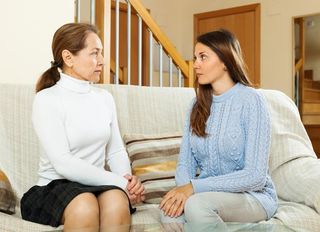
Embarrassment
When a Child Comes Out, Parents May Want to Go in the Closet
Your LGBT child may be out of the closet, but are you?
Posted April 26, 2017

It didn't matter that my son didn't tell us initially that he was gay. I was to discover a note with his name entwined with another's in a heart. That proof was all I needed to make me want to retreat, to isolate, or, ironically, to go "in the closet."
Why did I have this reaction? I lived in a New York City suburb with a reputation for good schools and liberal people. I had worked side-by-side in the arts with gay people. So, why did I feel this gut-wrenching shame? Why did I want to cocoon myself? This is not an unusual response, says psychiatrist Jonathan Tobkes, co-author of When Your Child Is Gay: What You Need To Know (Sterling, 2016). "When a parent becomes annoyed at a child's coming out," says Tobkes, "it's because they believe that their child is making a choice and that their child is 'doing this to them.'"
Tobkes calls the idea that your child is being gay and that he is doing something to you "egocentric and flawed" — in other words, it's not about you! I had to learn this so the son I thought I knew didn't seem like a stranger with a new identity. The news jarred with my expectations for our son to have a traditional life — marrying the opposite-sex and having biological children. Even he told me in the seventh grade that he was going to marry CB, a classmate whom he saw regularly after school.
Of course, it never occurred to me that I might have a gay son. While I knew that no one had the power to make him gay, as was disproved with the theory that homo-sexuality was the result of an overbearing mother and a distant father, I still found the new situation scary.
I may have known gay people, but I didn't know their parents. Whose parents would I emulate? When you suddenly know you have a gay child, your family dynamic changes. You know have a minority child. You have extra concerns that might stay with you all day and all night long: Will my child be bullied, will my child be physically attacked, would his school friends drop him once they find out he's gay? Will he have to live in gay-friendly cities when he's older, will he be fired from a job with no recourse because his boss is homophobic? Will he get HIV?
Aside from the perpetual worries for him, I was concerned for myself. Would people gossip about us? Would his little sister blab to everyone that her brother is gay? These are issues that I didn't have to concern myself with before.
I was embarrassed and ashamed. Tobkes defines shame "as a pervasive negative emotion about how we feel overall when we think we have not met societal or cultural expectations. It arises when we feel that our personal defects or flaws are exposed." But when you realize that having a gay child is not a disability, you will no longer regard being gay as a loss. "Acceptance," confirms Tobkes, "involves acknowledging the reality of a particular situation and recognizing that it is not in your power to change unchangeable, the only way to alleviate internal angst and achieve a sense of equanimity is through acceptance."
How do you work through shame and fear so you can achieve this state? How do you keep yourself out of the closet?
- Work through your issues by seeking advice of those who've been there. PFLAG (Parents of Lesbians and Gays, now with transgender meetings) has parents who can advise you. Find a chapter near you.
- You may want to talk to a therapist who has a specialty in counseling LGBT clients.
- Appreciate your LGBT child for himself (or herself). He still has the same good qualities.
- Treat him with the same respect you do your straight child. Tobkes suggests that you ask your child the same questions you ask your other child. Specifically, don't avoid the topic of dating and relationships.
- Talk to other family members and friends openly about your child being gay, and share the same information you would with them about his dating life as you would about your straight child.
- Regard your life, with its initial challenges as a benefit to grow as a strong person in much the same way as your gay child has to overcome prejudice to be a resilient, mature individual.

